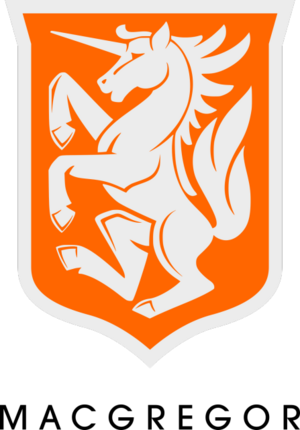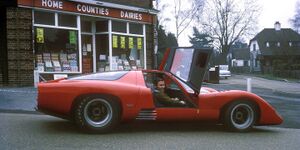MacGregor Cars
This article is incomplete because it is pending further input from participants, or it is a work-in-progress by one author. Please comment on this article's talk page to share your input, comments and questions. Note: To contribute to this article, you may need to seek help from the author(s) of this page. |
 | |
| Private | |
| Industry | Automotive |
| Predecessor | MacGregor Racing |
| Founded | June 2, 1975 in Sherbourne, Aswick |
| Founder | Glenn MacGregor |
| Headquarters | MacGregor Centre, Sherbourne , |
Area served | Astyria |
Key people | Glenn MacGregor Richard Stevanage David Valkenberg |
| Products | Sports cars |
Production output | 5,424 units[1] |
| Revenue | £1.562 billion[1] (2019) |
| £31.248 million[1] (2019) | |
| £40.842 million[1] (2019) | |
Number of employees | 4,568[1] (2020) |
| Divisions |
|
| Website | MacGregor.co.asw |
MacGregor Cars (Commonly referred to as just MacGregor) is an Aswickan designer and manufacturor of high-end sports cars. It was originally founded in 1970 as MacGregor Racing by Formula One racing driver Glenn MacGregor, in order to compete in the Astyrian Formula One racing series. MacGregor, however, quickly found that money could be made by design and sale of sports cars, using experience he and his designers gained in Formula One. Initially, the brand was marketed as the best way to experience high speed racing at a price lower than what was generally offered.
History
MacGregor Racing
In 1970, The Scotian Formula One driver Glenn MacGregor founded MacGregor Racing in a bid to continue his career in the sport after an injury led him to be unable to drive competitively. The team missed the first race of the season, and then failed to meet the expectations though it managed to finish in a respectable 4th place.[2] The following year, however, given more time to prepare, the team got back and won its first championship. Though for the next few years they by no means dominated, the team made good showings in the sport.
MacGregor Cars
In 1975, MacGregor decided to expand the company. He renamed MacGregor Racing to MacGregor Cars, and formed a division dedicated to Formula One to take the company's former place in the sport. That same year, the first designs for a road legal race car were unveiled. The following year, the MacGregor Scotia entered production. A total of 1,500 were built in the next 10 years.
After this initial production run, the company began production of its successor: The MacGregor Aswick. Although this model performed slightly lower than expected, MacGregor still produced more units than they did of the Scotia.
In 1995, the company unveiled the MacGregor GP (Grand Prix), a high end super car with a production run of only 150 cars. Many considered this to be MacGregor's finest achievement, even surpassing their success in Formula One. Upon its debut it was the fastest car in the world, reaching a top speed of 386 km/h. Though in the interim they did build the Mamba as well, in 2010, the GP was succeeded by the Super GP. This car was still just as exclusive even though the company produced more than two for every GP ever made.
Facilities
MacGregor Cars is based at the MacGregor Centre, located in Sherbourne, Sheffield. It is used by MacGregor Cars, as well as both of its divisions. In addition to the offices, the MacGregor centre hosts its own production building, which is connected to the main building by tunnel.
The MacGregor Centre was formally opened by Glenn MacGregor and the Duke of Sheffield in 2001.
Products
Current models
| Model | Type |
|---|---|
| 10S, 10C, 10LT | Sports |
| 11S, 11C, 11LT | Sports |
| Norris | Super |
| GT | Sports GT |
| Bat | Hybrid Sports |
Past models
| Model | Production run | No. produced |
|---|---|---|
| Scotia | 1976-1986 | 1,500 |
| Aswick | 1986-1996 | 2,500 |
| GP | 1995-2003 | 150 |
| Super GP | 2010-2012 | 400 |
| Mamba | 2005-2015 | 10,000 |
Divisions
MacGregor F1 has been the company's biggest division since 1975. This racing team has been a highly successful one in Astyrian Formula One, winning 13 Constructors' Championships and 15 Drivers' Championships. Much of their recent success in F1, particularly their 2019 season, is attributed to the team's chief designer, Sir Alan Valkman.[3]
